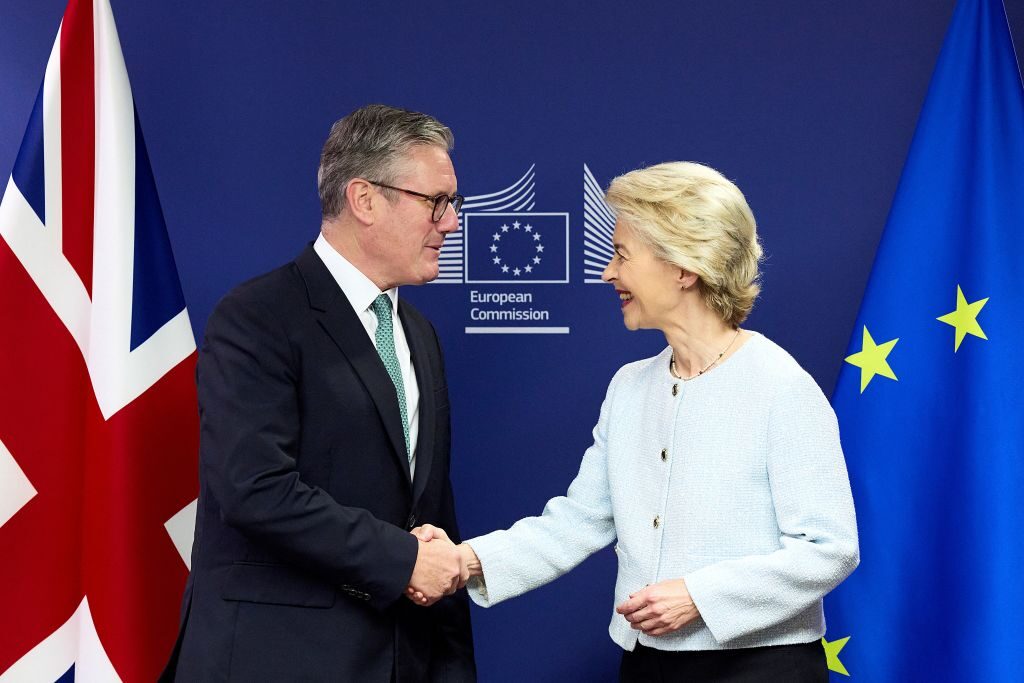America is once again at war — a trade war, this time, with the rest of the world. Donald Trump declared hostilities yesterday evening, announcing a package of tariffs on US trading partners, including the UK.
There will be a 25% tariff on cars imported by the US and a minimum 10% tariff on all imports. For many countries, the minimum is just a starting point — extra “reciprocal” tariffs will be charged depending on a US government assessment of all trade barriers (not just tariffs) to American exports. Though the UK won’t have to pay as much as the EU, hopes that we would escape the basic 10% tariff — plus the 25% tariff on cars — have been dashed.
As for how much this is going to cost us, there’s an estimate in the latest outlook from the Office for Budget Responsibility. Under its “scenario 3” — i.e. a full trade war between America and all its trading partners, including the UK — the OBR reckons British GDP would be reduced by 1% next year and 1% the year after that, with diminishing subsequent effects.
That’s bad, but not catastrophic. What’s more, the OBR forecasts don’t account for what a smart response to these economic pressures might achieve. According to the Times this week, British companies are already set to invest $650 billion over the next three years on reshoring productive capacity from China and other locations.
The calculation is that disruptions to international trade — of which Trump’s fondness for tariffs is just one example — have wiped out the cost advantages of offshoring industrial production. The British Government could and should lean into this tipping point, tearing down barriers to re-industrialisation.
This is especially important if Trump’s “tough love”, as he called it yesterday, forces the UK to double or treble its defence budget. By far the best way of affording this enormous cost is to ensure that British employers and employees are positioned to benefit from the extra spending. In other words: never let a crisis go to waste.
There are those who’d rather use the trade dispute with America to stampede Britain back into the EU. The Liberal Democrats are leading the charge, with Ed Davey calling for Britain to rejoin the EU’s Customs Union. This would expose us to higher tariffs and end our ability to set our own trade policy. It would also force us to leave the CPTPP trade agreement, which provides a model of free cooperation between sovereign nations — and an alternative to the dark vision of a world divided between predatory trade blocs.
But what if that dark vision is the new reality, thus compelling the UK to join (or rejoin) the least worst option? Prominent Remainers are already making the case that Trump’s refusal to exempt the UK from his trade war is a “clarifying moment”, and that we must “turn to the EU”. Expect a lot of this in the weeks ahead.
However, such responses overlook the fact that Brussels is as much of a protectionist bully as Washington — if not worse. At least the Americans aren’t demanding that Britain pay billions into their federal budget or make net contributions to their agriculture subsidies. Nor are they attempting to dictate our immigration policy or subjugate our parliament to foreign laws.
As a member of the European Union, Britain was forced into all of these humiliations. And in return for what? Not much more than the right to trade with its closest neighbours, which is something that it could have negotiated — as equals — had the EU never existed.
Donald Trump forgets he’s dealing with America’s allies rather than his business cronies. Yet we mustn’t ignore the fact that his presidency will last for years, not decades — unlike any agreement to return to Brussels. Things could be far worse for Britain.











Join the discussion
Join like minded readers that support our journalism by becoming a paid subscriber
To join the discussion in the comments, become a paid subscriber.
Join like minded readers that support our journalism, read unlimited articles and enjoy other subscriber-only benefits.
Subscribe